Crafting Unique Cocktails: Your Guide to Custom Kits
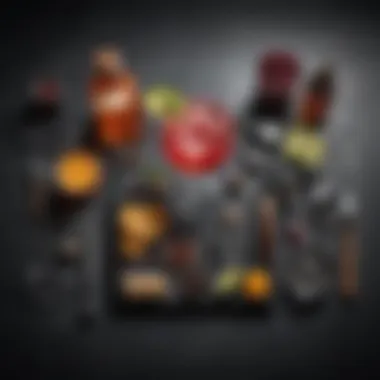
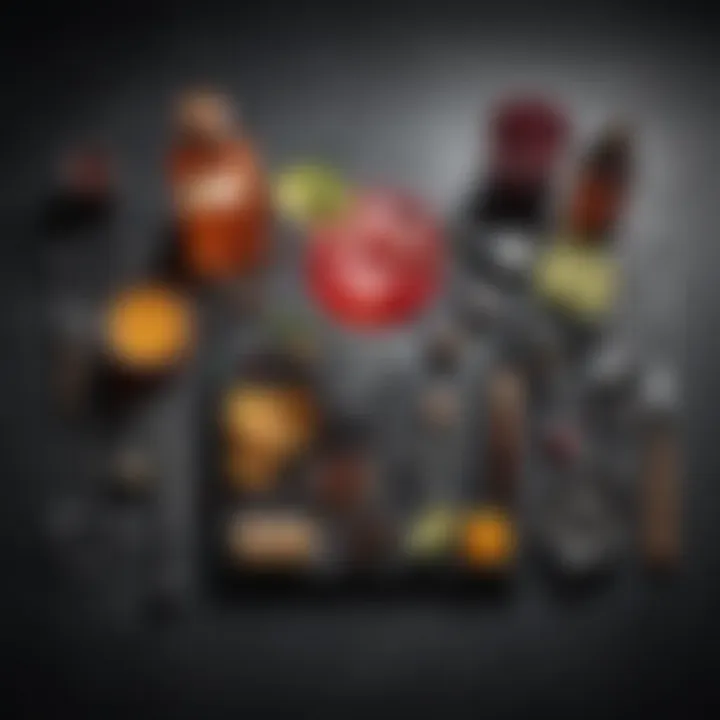
Intro
The rise of custom cocktail kits presents a unique opportunity for both seasoned mixologists and those new to the world of crafting drinks. These kits allow individuals to explore diverse flavors, experiment with ingredients, and refine their skills in the comfort of home. They empower drink enthusiasts to tailor their beverage experiences to their own tastes, unlocking a new level of creativity and personalization.
In this guide, we will unpack the essential components of custom cocktail kits, along with methods of creating and personalizing them. We will also examine the chemistry behind the flavors that make drinks enjoyable. You will learn how to construct your own kits, what ingredients and tools are necessary, and how to elevate your gatherings through thoughtful cocktail selections.
Ingredients Breakdown
Creating a truly personalized cocktail kit begins with understanding the ingredients involved. Below, we provide an overview of the key components that form the backbone of your selections.
Primary Ingredients
The foundation of any cocktail is its primary ingredients, generally categorized as:
- Spirits: These include vodka, gin, rum, whiskey, and tequila. Each spirit contributes a unique flavor profile to the drink.
- Mixers: These can be sodas, tonic water, juices, or flavored syrups that enhance and complement the spirit.
- Bitters: A small amount of bitters can transform a cocktail's flavor, adding depth and complexity.
Optional Ingredients
In addition to the primary ingredients, consider incorporating optional items. These can greatly enrich your cocktail kit:
- Fresh Herbs: Mint, basil, or cilantro can add a fresh note to many cocktails.
- Fruits: Berries, citrus, and other fruits can enhance flavors and add visual appeal.
- Spices and Flavors: Cinnamon, vanilla, or other unique flavors can offer your cocktails a distinct twist.
Essential Kitchen Tools
To craft cocktails effectively, certain tools can enhance the experience:
- Shaker: A necessary tool for mixing drinks with ice.
- Strainer: Helps to keep ice and solid ingredients from entering the final drink.
- Muddler: Useful for extracting flavors from fruits and herbs.
- Jigger: An accurate measuring tool for precise ingredient quantities.
"Understanding your ingredients is crucial. A great cocktail is the balance between its elements, both foundational and optional."
Step-by-Step Preparation
Once you've gathered your ingredients and tools, the next phase is preparation. A methodical approach ensures that your drinks come out as intended.
Prepping the Ingredients
Start by washing and cutting any fresh fruits or herbs you plan to use. Proper preparation can make a significant difference in flavor and presentation.
Cooking Techniques and Methods
Many cocktails require specific techniques like shaking, stirring, or muddling. Each technique plays a role in altering the drink's texture and flavor. For example, shaking is often used for drinks with fruit juices, while stirring is preferable for spirit-forward drinks.
Assembly and Presentation Tips
Finally, the assembly of the cocktail is where creativity shines. Make use of glassware that suits your drink’s personality. Garnishes such as a sprig of mint or a rim of salt can elevate the visual appeal and flavor profile.
Dietary Considerations
Cocktails should cater to a variety of dietary needs, ensuring inclusivity at social gatherings.
Gluten-Free Options
Many spirits are naturally gluten-free, but be cautious with flavored mixers. Always check labels when necessary to accommodate gluten-free diets.
Vegetarian and Vegan Substitutes
Most cocktails can be made vegan by opting for plant-based mixers. Ensure that garnishes do not include animal products.
Nutrition Facts & Nutritional Considerations
While cocktails are often seen as indulgent, being mindful of nutritional content can be beneficial. Opt for low-sugar mixers and be aware of portion sizes to maintain balance.
Variations and Customizations
The beauty of custom cocktail kits lies in their flexibility. Every drink can be tailored to fit personal tastes or specific occasions.
Flavor Enhancements
Consider incorporating flavored spirits or unique mixers to create signature drinks. This approach can give your kit character.
Alternative Cooking Methods
Don’t hesitate to experiment with techniques like infused spirits or cold brew coffee. Such methods can surprise and delight.
Pairing Suggestions (Sides, Drinks, etc.)
Think about what foods or additional drinks pair well with cocktails. Selections can range from light appetizers to more substantial fare, ensuring a holistic experience.
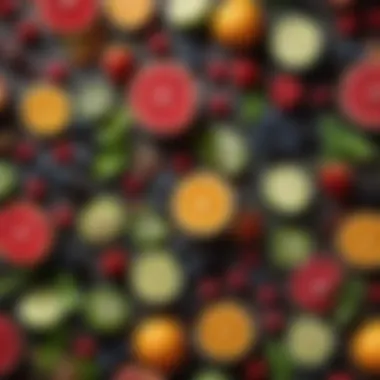
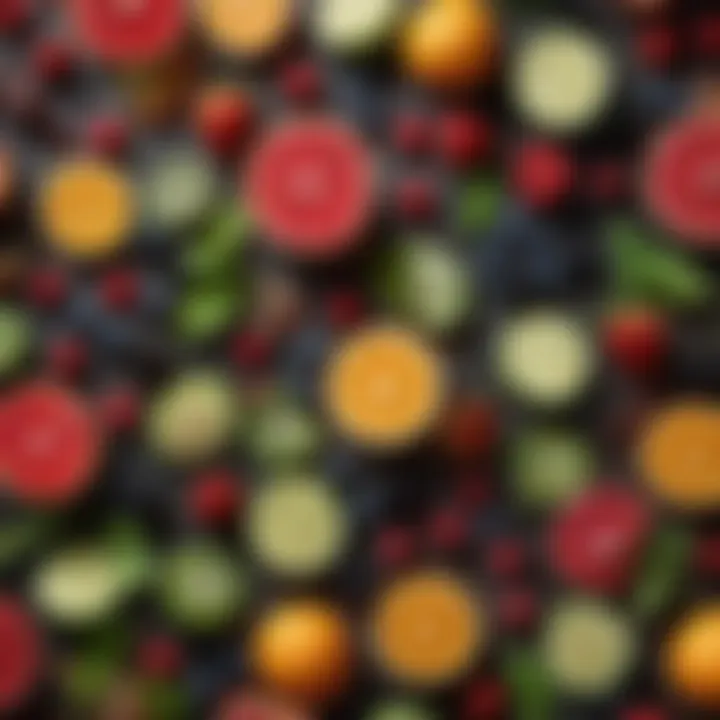
Common Answers to Common Questionss and Troubleshooting
When venturing into custom cocktails, questions often arise. Here is a compilation of common queries and solutions.
Frequently Asked Questions
- What types of spirits should I include in my kit?
- How do I ensure freshness in my ingredients?
- Including a mix of base spirits like vodka, gin, and whiskey allows for varied cocktail creations.
- Store perishable items properly and consider making small batches to avoid waste.
Common Mistakes to Avoid
- Forgetting to balance flavors can lead to one-dimensional drinks.
- Not using fresh ingredients will compromise your cocktails’ quality and taste.
Solutions to Potential Problems
If your cocktail is too strong, add a splash of soda water or fruit juice. For over-frequent failures in preparation, revisiting basic techniques can be beneficial.
In summary, creating custom cocktail kits allows individuals to explore their creativity through the world of drinks. Understanding the components and preparation methods opens up endless possibilities for personalization and enjoyment.
Understanding Custom Cocktail Kits
Custom cocktail kits have emerged as a significant trend in the realm of home mixology. These kits not only simplify the cocktail-making process but also cater to a diverse range of tastes and preferences. Understanding custom cocktail kits enriches not just individual experiences but also has broader cultural implications. It reveals how these kits serve as a bridge for casual drinkers and serious enthusiasts alike to explore the art and craft of cocktail making.
Definition and Overview
A custom cocktail kit is essentially a curated collection of ingredients and tools designed to help individuals create their own cocktails at home. Unlike pre-mixed cocktails or ready-to-drink beverages, these kits offer the flexibility to mix, match, and personalize drinks to suit personal tastes. A basic cocktail kit typically includes essential components, such as base spirits, liqueurs, bitters, and a selection of mixing tools like shakers and jiggers. The beauty of these kits lies in their ability to empower users to experiment and create unique concoctions, fostering individual creativity within the realm of cocktails.
Historical Context
To appreciate the rise of custom cocktail kits, it is important to consider the historical context of cocktail culture. Cocktails trace back to ancient civilizations but gained prominence in the 19th century, particularly in the United States. The publication of Jerry Thomas’s "The Bartender's Guide" in 1862 marked a shift in cocktail-making, blending science and art.
Fast forward to the late 20th century, a revival in cocktail culture occurred. With an increasing interest in craft cocktails, gourmet ingredients, and artisanal methods, the home mixology movement grew. This paved the way for the modern custom cocktail kits, where technology and social trends converge. The ease of access to quality ingredients and educational resources, like online tutorials, makes cocktail crafting approachable for everyone, not just trained bartenders.
In summary, understanding custom cocktail kits involves recognizing their role in democratizing the cocktail experience. They help foster enjoyment and appreciation of mixology, whether for casual gatherings or personal reflection.
Core Components of a Cocktail Kit
Understanding the core components of a cocktail kit is crucial for anyone looking to craft drinks at home. A well-equipped cocktail kit can enhance the overall experience, allowing both novice and experienced mixologists to experiment with creativity and precision. Each element in a cocktail kit plays a significant role in the outcome of a drink. The following sections detail the essential ingredients, mixing tools, and garnishes that constitute a complete cocktail kit.
Essential Ingredients
Base spirits
Base spirits are the foundation of any cocktail. They form the bulk of the drink and can significantly influence its flavor profile. Common base spirits include vodka, gin, rum, tequila, and whiskey. Each type offers a unique taste and character, allowing for a wide range of cocktail creations. The versatility of base spirits makes them a popular choice. For instance, vodka is known for its neutrality, making it adaptable for countless mixtures. However, whiskey brings boldness, adding complexity to drinks. It is essential to select high-quality base spirits as their characteristics will impact the overall drink quality.
Liqueurs
Liqueurs add complexity and sweetness to cocktails. They are often infused with flavors and provide depth to the overall taste. Popular options include triple sec, vermouth, and amaretto. The defining feature of liqueurs is their sweetness, which contrasts with the robustness of the base spirit. This combination creates a balanced flavor profile. Choosing the right liqueur can elevate a simple cocktail into a sophisticated drink. However, one must be cautious with the amount used, as overwhelming sweetness can overshadow the primary flavors of the base spirit.
Bitters
Bitters are a minimal but essential component in many cocktail recipes. Made from herbs, spices, and other botanicals, they function as flavor enhancers. A few dashes can transform the palate, adding intrigue to the drink. The key characteristic of bitters is their concentrated flavor, often leaning towards bitter than sweet. They are viewed as an underrated ingredient but can be a powerful tool for mixologists. The unique features of bitters lie in their complexity and variety, which create endless possibilities in cocktail crafting. However, care should be taken to balance their use, as excess can lead to an overly bitter drink.
Mixing Tools
Shakers
Shakers are vital for combining ingredients effectively. They allow for proper mixing and chilling of cocktails, which is crucial for both taste and texture. The most common types are Boston shakers and cobbler shakers. The key benefit of using a shaker is the ability to integrate flavors thoroughly. A solid shake can create a well-blended drink that feels authentic. While shakers are relatively simple, choosing a durable one ensures longevity in usage.
Strainers
Strainers are important for achieving the perfect consistency in cocktails. They prevent unwanted particles or ice from entering the glass. The primary types include Hawthorne and fine mesh strainers. Their key feature is the ability to deliver a clean pour. This is particularly essential in cocktails with multiple layers or garnishes. Proper use of strainers avoids dilution and preserves the intended flavor profile. However, it is essential to choose the right type of strainer to match the cocktail style.
Jiggers
Jiggers are indispensable for measuring ingredients accurately. This tool helps ensure consistent flavor in every drink. They come in various sizes, allowing for precise measurements of both spirits and mixers. The primary benefit of using jiggers is the control they offer in cocktail preparation. Consistent measurements are vital for creating balanced cocktails. Moreover, having a jigger on hand can simplify the mixing process, making it easier for those new to mixology.
Garnishes and Presentation
Citrus zests
Citrus zests add brightness and freshness to cocktails. They play a crucial role in enhancing aroma and flavor. Popular choices include lemon, lime, and orange zests. A key characteristic of citrus zests is their ability to provide a contrast to the sweetness of the drink. They create a refreshing experience or can add acidity to balance flavors. However, overdoing it can lead to excessive bitterness or sourness in the drink.
Herbs
Herbs bring another layer of flavor and aroma to cocktails. Common herbs include mint, basil, and thyme. Their key contribution lies in the freshness they add to the drink. Many cocktails benefit from the aromatic quality that herbs provide, making even simple drinks taste elegant. However, it's important to use herbs sparingly, as their strong flavors can dominate the drink.
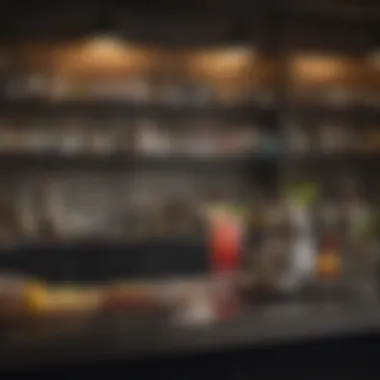

Specialty ice
Specialty ice can enhance both the aesthetics and functionality of cocktails. Different shapes and sizes of ice can affect how drinks chill and dilute. Larger ice cubes melt slower, keeping drinks colder for longer without watering them down quickly. The visual appeal of specialty ice also adds to the overall presentation of cocktails. However, sourcing such ice can present challenges, and one must consider practicality alongside presentation.
Creating Your Custom Cocktail Kit
Creating a custom cocktail kit is essential for anyone wishing to deepen their involvement in mixology. It allows individuals to explore their tastes, learn about different flavors, and enhance their alcohol crafting skills. A well-designed kit caters to personal preferences and includes all necessary components, making the cocktail preparation process more straightforward and enjoyable. Moreover, developing your own cocktail kit encourages creativity, pushing one to experiment with various ingredients and techniques. Customization also brings a sense of ownership and pride, leading to more memorable experiences while enjoying cocktails.
Selecting Your Base Spirits
The base spirit forms the cornerstone of any cocktail. These spirits offer distinct flavor profiles that determine the overall character of the drink. When selecting base spirits, consider the following:
- Types of Spirits: Common choices include vodka, gin, rum, tequila, and whiskey. Each type brings unique qualities to cocktails. For instance, gin provides herbal notes while whiskey brings depth and richness.
- Personal Preference: Take your taste preferences into account. Some may favor the smoothness of vodka, while others may be drawn to the complexity of a good whiskey. This selection heavily influences the cocktails you create.
- Quality Over Quantity: Investing in high-quality spirits can significantly enhance the cocktail experience. Opt for reputable brands to ensure a well-rounded flavor in your drinks.
"The right base spirit can elevate a simple combination into an unforgettable cocktail experience."
Choosing Complementary Flavors
After selecting base spirits, the next step involves choosing complementary flavors. This aspect is crucial for crafting a balanced cocktail. Think about:
- Liqueurs: These can add sweetness or complexity. Consider options like triple sec for citrus undertones or vermouth for a herbaceous touch.
- Mixers: Soda, tonic water, or fruit juices can help create refreshing drinks. Choose mixers that complement your base spirit effectively. For example, gin and tonic pairs the botanical qualities of gin with the crispness of tonic water.
- Bitters and Syrups: These can introduce depth and richness. Experimenting with different bitters can dramatically change the cocktail profile. Simple syrups, such as honey or agave, can also be used to cater to personal tastes.
Adaptations for Different Occasions
The concept of custom cocktail kits extends far beyond mere convenience for home drinkers. Tailoring these kits for specific occasions not only enhances the experience but also demonstrates consideration for guests’ preferences and the settings in which the drinks will be enjoyed. Different events require different approaches, and understanding this can result in memorable experiences and a more enjoyable atmosphere.
Crafting Kits for Casual Gatherings
Casual gatherings feature a relaxed atmosphere, often characterized by friends or family coming together for social interaction without the formality of a structured event. For these occasions, a custom cocktail kit that emphasizes simplicity and variety can appeal to a wider audience.
When creating a kit for a casual setting, consider the following elements:
- Versatile Recipes: Include recipes that can be prepared quickly. Classic cocktails like margaritas or mojitos work well since they are crowd-pleasers and have simple ingredients.
- Ingredients for Customization: Provide a selection of mixers and garnishes. This lets guests experiment with flavors, enhancing their engagement and enjoyment.
- Appropriate Tools: Basic tools like shakers and jiggers should suffice. Fewer tools mean less clean-up, making it more enjoyable for everyone.
Incorporating a theme can also work well. For example, a tropical or summer theme might include rum, fresh fruit juices, and vibrant garnishes, creating a fun atmosphere.
Formal Events and Celebrations
Formal events, such as weddings, corporate parties, or anniversaries, demand a more sophisticated approach to cocktail kits. The drinks served should align with the tone of the event. For these occasions, consider the following factors:
- Elegance in Presentation: Focus on premium spirits and meticulous garnishing. A well-presented drink has a greater impact and exudes a sense of luxury.
- Signature Cocktails: Including one or two signature cocktails adds a personal touch. This could reflect the hosts’ tastes or even the theme of the event.
- Wine Pairings: For some formal events, placing emphasis on wine alongside cocktails can enhance the beverage experience. Consider including options for both.
It's crucial to ensure that all elements—ingredients, tools, and instructions—are carefully curated to reflect the sophistication of the occasion. This not only ensures that the drinks serve as a conversation starter but also as a remarkable aspect of the event that guests will remember.
"A cocktail is not just a drink; it is an experience that reflects the occasion and resonates with the guests."
By effectively adapting cocktail kits for casual gatherings or formal celebrations, hosts can create tailored experiences that elevate social interactions. A well-planned approach to the beverage selection not only satisfies the palate but also enhances the overall ambiance of any occasion.
Popular Recipes to Consider
Understanding popular recipes is essential for anyone venturing into the realm of custom cocktail kits. These recipes serve as a foundation, offering a bridge between familiar flavors and the creative experimentation that lies ahead. Popular recipes not only inform the choice of ingredients but also help to establish the balance of flavors essential to crafting a well-rounded cocktail. Moreover, they provide a starting point for both novice and experienced mixologists alike, ensuring that even the simplest of gatherings can feature remarkable concoctions that impress.
Classic Cocktails
Classic cocktails are the cornerstone of any respectable cocktail kit. These timeless recipes, such as the Martini, Manhattan, or Old Fashioned, have stood the test of time, each with a rich history and distinct character. They are invaluable for understanding the interplay of ingredients and proportions. The exploration of classic cocktails offers insight into traditional techniques that can enhance one's cocktail-making skills.
- Martini: A blend of gin and dry vermouth, garnished with an olive or a twist of lemon. This drink exemplifies simplicity and elegance.
- Manhattan: Made with whiskey, sweet vermouth, and bitters, this cocktail embodies the spirit of New York City.
- Old Fashioned: Composed of bourbon, sugar, bitters, and a twist of citrus, it is a superb example of the basics in cocktail preparation.
These recipes often serve as the baseline for personal adaptations, where flavors can be modified to match individual preferences.
Signature Creations
Crafting signature cocktails allows individuals to express their unique personality and taste through mixology. These creations, which can combine unconventional ingredients or unexpected flavor pairings, encourage creativity and experimentation within the cocktail kit framework. By developing a signature cocktail, a mixologist can showcase their skills at social events or simply enjoy a personalized drink at home.
When designing signature cocktails, consider the following:
- Personal Preferences: Select flavors that resonate personally. Perhaps you favor tropical notes or spiced undertones. Incorporating these elements can lead to a more satisfying experience.
- Seasonal Ingredients: Fresh ingredients such as fruits, herbs, and spices vary by season. Embrace these changes to add unique touches to your cocktails, enhancing their depth.
- Visual Appeal: The presentation can elevate a basic drink into something memorable. Experiment with garnishes, glassware, or even ice shapes.
In summary, the exploration of popular recipes like classic cocktails and the development of signature creations are critical elements in the journey of building custom cocktail kits. They not only enhance the quality of the beverages produced but also elevate the overall experience for both the maker and the consumer.
Exploring Flavor Profiles
Understanding flavor profiles is essential in creating custom cocktail kits. Flavors are the foundation of any drink, and recognizing how different elements interact profoundly influences the quality and enjoyment of cocktails. This section elaborates on various flavor components, showcasing their significance in crafting exquisite drinks that cater to personal preferences.
Sweet, Sour, and Bitter
The balance of sweet, sour, and bitter is fundamental to cocktail crafting. Each of these flavor components serves a distinct purpose.
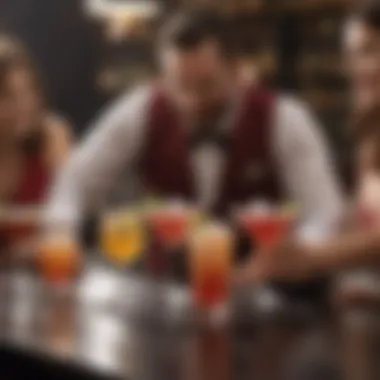

- Sweetness: Often derived from ingredients like syrups, liqueurs, or fresh fruits, sweetness can enhance the overall experience. It masks harshness from alcohol and creates a smoother palate.
- Sourness: Citrus juice, such as lemon or lime, adds a refreshing tang that cuts through sweetness. Sour flavors provide brightness, lifting the drink's profile and offering a more rounded taste.
- Bitterness: Ingredients like bitters or aperitifs add complexity and depth. Bitter elements counterbalance sweetness, providing layers of flavor that prevent the cocktail from becoming monotonous.
Finding the right balance among these flavors involves experimentation. Start with a base recipe and adjust the sweetness, sourness, and bitterness to suit your taste. This trial-and-error approach will lead to discovering unique combinations that please your palate.
Balancing Ingredients
Ingredient balance is crucial when designing cocktails. Each component must work harmoniously to create a cohesive drink. Consider the following points:
- Proportions: Adjust the ratio of base spirits, mixers, and garnishes. A well-balanced cocktail often follows a simple rule: two parts base spirit, one part sour, and one part sweet. However, feel free to adjust based on the specific ingredients you use.
- Taste Testing: After mixing ingredients, taste the cocktail. Look for any overpowering flavors and adjust accordingly. Sometimes, a splash of soda or a dash of bitters can elevate the drink's profile and enhance overall enjoyment.
- Personal Touch: Don’t hesitate to experiment with unusual ingredients. Different bitters, such as orange or chocolate, or unique syrups can offer delightful surprises. Consider experimenting with flavors that resonate with your personal preferences.
"A cocktail can be a masterpiece when its components are perfectly balanced. Each sip should tell a story, where flavors complement rather than compete."
The Role of Garnishes
Garnishes serve as more than mere decoration atop a cocktail; they play a fundamental role in shaping the drink's overall appeal and character. Incorporating thoughtful garnishes can elevate a drink from ordinary to extraordinary. Not only do they enhance the visual presentation, but also they contribute to the drink's flavor profile. When assembling a custom cocktail kit, paying attention to garnishes is essential.
Enhancing Visual Appeal
The first impression of a drink is visual. Cocktail garnishes can significantly impact how a drink is perceived. A well-selected garnish can create an inviting aesthetic that draws attention and entices individuals to engage with the beverage. For instance, a vibrant citrus twist can brighten up a classic gin and tonic, while fresh mint leaves can add a refreshing look to a mojito.
To craft a visually pleasing cocktail, consider the following:
- Color Coordination: Match the garnish color with the drink to create harmony.
- Texture Variation: Contrasting textures, such as smooth and rough, can add depth.
- Height and Placement: Taller garnishes can create an impressive visual effect when placed correctly.
Adding Aromatic Elements
Aromatics are a crucial element of the drinking experience, often overlooked. The scent that a garnish imparts can complement or even enhance the flavors of the cocktail. For example, a sprig of rosemary not only looks appealing but also adds an aromatic profile that resonates with the drink’s spirit.
Scent has a significant influence on taste perception. When choosing garnishes, a few points to consider include:
- Freshness: Use fresh herbs or fruits for optimal aroma.
- Layering Scents: Combine garnishes that offer a contrast in scents for a nuanced profile.
- Integration with Flavors: Select garnishes that echo or enhance the primary flavors of the cocktail.
The significance of garnishes should not be understated. They enrich the drinking experience through both visual and aromatic contributions, forming a deeper connection between the drinker and the creation.
To summarize, garnishes are not just decorative add-ons; they are essential components that enhance the experience of enjoying cocktails. By considering both aesthetics and aroma, individuals creating their custom cocktail kits can ensure that each drink is not only tasty but also visually appealing and engaging.
Safety and Responsibility in Cocktails
Understanding safety and responsible behavior when consuming cocktails is paramount in the enjoyment of these crafted beverages. Custom cocktail kits allow for creativity and personalization, but they also require awareness about alcohol consumption. Encouraging a culture of responsibility helps in creating a more pleasurable experience for everyone involved.
When preparing your own cocktails, it is essential to consider the amount of alcohol used in each drink. Not only does this involve calculating the quantities of various spirits and mixers, but it also means understanding how these drinks affect individuals differently. Factors such as body weight, tolerance, and overall health can impact how a person metabolizes alcohol. Being informed can help to prevent any unfortunate situations that might arise from overindulgence.
Understanding Alcohol Content
Alcohol content is typically indicated by the Alcohol By Volume (ABV) percentage. This number tells you how much alcohol is present in a given volume of liquid. For instance, beverages like beer usually contain 4-6% ABV, while wines might range from 8-15%. Spirits, on the other hand, can vary significantly, usually hovering around 40% ABV.
It is crucial to be mindful of these figures while using custom cocktail kits. Mixing high-ABV spirits can easily increase the overall alcohol content of a drink, which may lead to unintended intoxication. Knowing the ABV of the ingredients can help in creating balanced cocktails that are enjoyable but safe to consume.
To further illustrate how mixology influences total alcohol consumption, consider the following:
- Standard Drink Measurement: A standard drink generally is considered to be 14 grams of pure alcohol. This typically translates to one 1.5-ounce shot of distilled spirits, a 5-ounce glass of wine, or a 12-ounce beer.
- Portion Control: Creating cocktails with proper measurements can help in regulating an individual's intake. For example, using jiggers to pour spirits allows for more controlled servings.
Guidelines for Responsible Drinking
Responsible drinking is not only about limiting intake but also about being aware of environmental and social factors. Here are some guidelines to enhance safety and enjoyment:
- Plan Ahead: Always consider transportation options if you plan to consume cocktails. Arrange for a designated driver, use public transport, or a rideshare service if necessary.
- Know Your Limits: Everyone has different tolerance levels. Learn what works for you and be willing to stop when you reach it.
- Eat Before and While Drinking: Consuming food before and during drinking can help mitigate alcohol's effects and aid in better overall enjoyment.
- Stay Hydrated: Alternating between alcohol and water can greatly help in managing consumption levels. Dehydration can exacerbate the feeling of intoxication.
"Understanding your body and the substances it processes improves your capacity to enjoy drinks responsibly."
Ultimately, promoting safety and responsibility in cocktail consumption encourages a more enjoyable beverage experience. By taking the time to understand alcohol content and by adhering to responsible drinking guidelines, individuals can appreciate their cocktails while ensuring a safer environment for themselves and others.
The Future of Cocktail Kits
As the cocktail culture continues to evolve, custom cocktail kits are expected to play a significant role in shaping how individuals approach beverage creation at home. The importance of focusing on the future of cocktail kits lies in the ever-changing preferences of consumers. People now seek experiences that are both enjoyable and unique, which cocktail kits can certainly offer. By blending convenience with creativity, these kits are appealing not just to novice enthusiasts but also to more seasoned mixologists.
Trends in Home Mixology
In recent years, home mixology has transformed from a casual hobby to a serious pursuit for many. Various trends are emerging within this sphere that are likely to define the trajectory of cocktail kits.
- Craftsmanship: More individuals are taking interest in artisanal ingredients. They prefer high-quality spirits and locally sourced ingredients, which leads to a demand for tailored kits that reflect personal tastes.
- Health Consciousness: Consumers are increasingly aware of health impacts. As such, there is a movement toward cocktails with lower sugar content or those infused with superfoods. Future cocktail kits may include such health-oriented recipes and ingredients.
- Personalization: The trend toward customization is rising. Consumers want kits that cater to their individual preferences, whether that is through flavor profiles, preferred spirits, or dietary restrictions. This calls for suppliers to adapt their offerings to ensure a broad range of choices.
The blending of these trends indicates a shift towards a more sophisticated approach to home mixology. As people become more serious about their drinks, the future of cocktail kits will likely mirror this evolution, emphasizing quality, health, and personal touch.
Technological Innovations
Technological advancements are increasingly influencing the future of cocktail kits. Tools and gadgets that enhance the mixing experience provide added value to cocktail enthusiasts. Here are several technological elements that stand to impact this market:
- Smart Shakers: New shakers equipped with sensors to measure exact ingredient ratios promise precision in creating cocktails. These gadgets often sync with apps for recipe guidance and tracking.
- Automated Mixing Systems: Some companies are developing machines that automate the cocktail-making process. These systems can replicate complex recipes with high accuracy, making mixology accessible to all skill levels.
- Virtual Mixology Classes: With the rise of online learning platforms, many people are turning to virtual classes to hone their skills. Companies may leverage this trend by offering kits that come with access to exclusive online tutorials.
The fusion of technology with traditional mixing techniques leads to innovative cocktail crafting experiences. This evolution assures that cocktail kits will remain relevant, engaging both seasoned and new mixologists alike.
"The cocktail culture is evolving. Customization and quality will dictate the future of cocktail kits."
Looking ahead, these elements and trends represent just a fraction of what is to come in the cocktail kit industry. Their impact will be felt across different aspects of both casual and formal gatherings, reflecting broader shifts in social and personal engagement with beverages.







